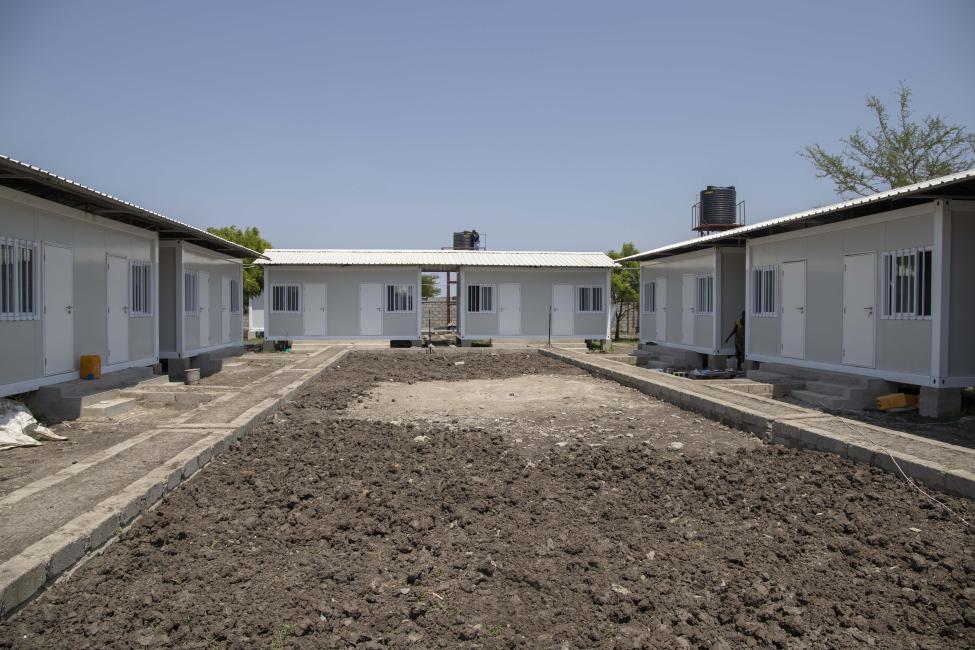-
Who We Are
WHO WE AREThe International Organization for Migration (IOM) is part of the United Nations System as the leading inter-governmental organization promoting since 1951 humane and orderly migration for the benefit of all, with 175 member states and a presence in over 100 countries. IOM has had a presence in South Sudan since 2011.
About
About
IOM Global
IOM Global
-
Our Work
Our WorkAs the leading inter-governmental organization promoting humane and orderly migration, IOM plays a key role to support the achievement of the 2030 Agenda through different areas of intervention that connect both humanitarian assistance and sustainable development. IOM South Sudan provides a comprehensive response to the humanitarian needs of migrants, internally displaced persons, returnees and host communities.
Cross-cutting (Global)
Cross-cutting (Global)
- Data and Resources
- Take Action
- 2030 Agenda
New Humanitarian Hub to boost efficiency in delivering humanitarian assistance in Pibor, South Sudan
Pibor – The International Organization for Migration (IOM) today handed over the newly constructed Pibor Humanitarian Hub in South Sudan’s Greater Pibor Administrative Area (GPAA), to Plan International, which will be responsible for the management of the hub.
The establishment of the humanitarian hub in Pibor will enable the expansion of operations across hard-to-reach areas of the GPAA through an increase in static humanitarian presence. The hub will provide safe, secure and reliable accommodation and office space for aid workers of both national and international organizations. It will help improve sustainability and the capacity of aid organizations to respond effectively and efficiently to natural disasters and other events that require humanitarian assistance.
Efforts to scale up support towards existing capacities for area-based response is crucially important in the face of challenges posed by unprecedented heavy flooding which can make road networks impassable, cutting off humanitarian aid. Likewise, protracted conflict across parts of the GPAA have triggered multiple displacements and collapse of livelihoods, also making the need for time critical and life-saving frontline activities ever more important.
“The Humanitarian Hub goes beyond just a physical structure. It is a way to ensure that when a humanitarian crisis occurs which calls for urgent response, humanitarian teams are ready on the ground to respond swiftly and effectively to save the lives of affected populations,” said Peter Van der Auweraert, IOM’s Chief of Mission in South Sudan.
“We need humanitarian teams to be as close as possible to the people they serve, and this is exactly what the humanitarian hub offers,” said Peter Van der Auweraert. “This hub will accommodate humanitarian workers from all humanitarian responders, both national and international alike."
The inauguration ceremony was attended by the heads of UN agencies and non-governmental organizations, the deputy Chairperson of the Relief and Rehabilitation Commission (RRC), and local authorities.
Speaking at the ceremony, the head of the Office for the Coordination of Humanitarian Affairs (OCHA), Steve O’Malley, said: “With funding from the South Sudan Humanitarian Fund, we are delighted to see the Pibor Humanitarian Hub open today. South Sudan is facing its highest levels of food insecurity and malnutrition since the country declared independence ten years ago and it is critical that we have a presence in areas where we can swiftly reach the most food insecure people.
“People in hard-to-reach areas in GPAA are facing catastrophic conditions. Sub-national violence, flooding and poor road conditions have made it difficult to reach people with humanitarian assistance. The humanitarian hub will help to ease the pressure on humanitarian organizations and play an important role to ensure more predictable humanitarian presence, building the confidence of people in the community.” concluded Steve O’Malley.
The Pibor Humanitarian Hub is funded by the South Sudan Humanitarian Fund (SSHF). This hub is part of a network of humanitarian hubs that IOM is setting up in remote areas of South Sudan where humanitarian needs are high.
For more information, please contact:
Liatile Putsoa at IOM South Sudan, Tel: +211 912 380 104, Email: lputsoa@iom.int
